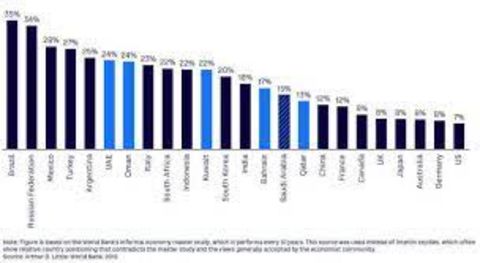GCC ‘in good position to formalise businesses’

Formalising businesses in the shadow economy would lead to increased economic growth, improved financial stability, and greater social inclusion in the GCC countries, a new study by Arthur D. Little has found.
The study titled ‘Delivering Inclusive Growth: Building a future-ready GCC SME sector through economic and financial inclusion’ highlights that informal businesses in the GCC region account for 18 per cent of GDP, which is well below the world average of 28pc. This means that GCC countries are in a good position to formalise businesses and reap the benefits that come with it.
The report describes the shadow economy as underground or informal sectors where unreported income, tax evasion, and illicit transactions elude government oversight.
Noting that the GCC is taking steps to increase tax enforcement and compliance, it says they include implementing more robust tax laws and strengthening the capabilities of tax authorities.
Regional governments are also working to simplify and accelerate the process of creating and maintaining small businesses, thereby making it easier for businesses to register, reduce the size of the shadow economy, and increase government revenue.
Promoting digitalisation in the financial sector and encouraging the use electronic payment systems, both ongoing initiatives in the GCC, are also set to increase transparency and result in a reduction of the shadow economy, while making all interactions with government services easier.
The authors of the report led by the firm’s UAE managing partner Philippe De Backer say: “Governments and development organisations in the GCC region recognise the important role that SMEs play in promoting economic improvement, job creation, and entrepreneurship and are working to support the development and growth of the SME sector in the region.”
Bahrain expects SMEs to contribute 50pc of the national GDP by 2030. The targets reflects the importance placed on the SME sector by the government and its commitment to supporting the future success of this sector.
The report also highlights the GCC focus on technology and innovation, women-led businesses, renewable energy, and tourism and hospitality for the development of SMEs.
By promoting technology-driven SMEs and backing the expansion of businesses in sectors such as e-commerce, fintech, and digital health, regional governments are helping to create a more dynamic and competitive business environment in the region.
The GCC is encouraging women-led SMEs and promoting gender diversity in entrepreneurship. This will help to unleash the potential of women entrepreneurs and contribute to economic growth.
Supporting the growth of SMEs in the renewable energy sector, including businesses focused on solar, wind, and hydro power, will help to reduce the region’s reliance on oil and gas and create a more sustainable future.
The report says the region is furthering the progress of SMEs in the tourism and hospitality sector, including businesses focused on eco-tourism and sustainable tourism. This will help to boost the region’s tourism industry and create jobs.
According to the authors, the fact that SMEs in the region are poised to quickly evolve in the coming years is evident from the strong hindsight of local governments, multiplied accelerators for SMEs and start-ups, and the rapid spread of legal and financing ecosystems.
The study concludes that GCC countries are on a path to achieve what has proven impossible for virtually any government in the last century: combining a state-driven economic transformation with a citizen-centred approach.


